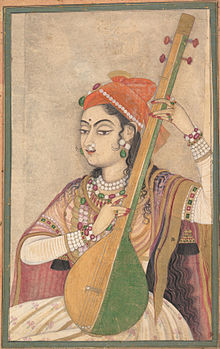Vande Mataram
From Wikipedia, the free encyclopedia
"Bande Mataram" redirects here. For other uses, see Bande Mataram (disambiguation).
| English: Vande Mataram | |
|---|---|
| Bônde Matorom (Bengali pronunciation); Vande Mataram (Sanskrit or Hindi pronunciation) | |
| Lyrics | Bankim Chandra Chattopadhyay,Anandamath (1882) |
| Music | Jadunath Bhattacharya |
| Adopted | 24 January 1950 |
| [hide]Music of India | |
|---|---|

A Lady Playing the Tanpura, ca. 1735 (Rajasthan)
| |
| Genres | |
| |
| Media and performance | |
| Music awards | |
| Music festivals | |
| Music media | |
| Nationalistic and patriotic songs | |
| National anthem | Jana Gana Mana |
| Regional music | |
| |
Vande Mataram (Bengali script: বন্দে মাতরম্, Devanagari: वन्दे मातरम्, Vande Mātaram)—literally, "I praise thee, Mother"—is a poem from Bankim Chandra Chatterjee's 1882 novel Anandamath.[1] It was written in Bengali and Sanskrit.
It is a hymn to the Mother Land. It played a vital role in the Indian independence movement, first sung in a political context by Rabindranath Tagore at the 1896 session of the Indian National Congress.[2]
In 1950 (after India's independence), the song's first two verses were given the official status of the "national song" of the Republic of India, distinct from the national anthem of India, Jana Gana Mana.
